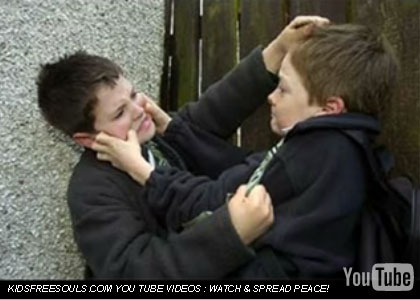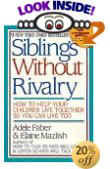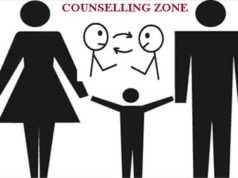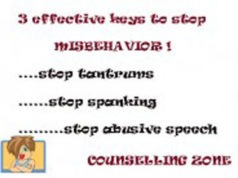I hope you bear with my email. I am really concerned about my son’s behavior. We have lavished love and attention to our 7 yr old son before our 3 yr old came along (and we try very hard upto now to still give him that love/attention even when the younger one is already there) But I don’t understand why he seems not to care for his brother. Not sharing food, toys, very much impatient with his brother, fighting, etc.
Plus, most of the time, I’m at a loss as to what kind of discipline will work for him…Small but irritating stuff, like when he’s laughing very hard, real hard, that the laughter is really annoying to everyone around him. And when I ask him to ‘soften’ his joy a little or tell him to keep a little quiet, he just wouldn’t listen. I don’t want to resort to physical punishments but when I am stressed from work, plus the house work, I often hit him – only to be guilty of it later on.
I am confused. I love them but find myself frustrated. I am now beginning to question myself as a good mother to my kids.
-Marinel
__________________________________________________________________________
COUNSELLING BY ILAXI PATEL
Siblings has ever been Homegrown rivals from age old time. Authors like Adele Faber & Elaine Mazlish has published books like Siblings Without Rivalry & How to Talk so kids will Listen & Listen so kids will Talk. However, my in-depth study on the psychology of childrens’ minds reveal the facts that their attitudes are solely dependent on their circumstances and their upbringing levels at home & school. It’s one thing sure any kid require is ‘Love, patience & Self Esteem.’
Movies like Sound of Music painted a glowing picture of a big family with warmth, sharing and fun and ready to support playmates. They reflect the belief that large families encourage resourcefulness, independence and responsibility while discouraging selfishness and feeling sorry for oneself.
Not anymore! Some think that a big family can be a buffer against what they see as the rootless ness and isolation of modern life. Whatever, the brunt of raising a family falls mainly on the woman, despite efforts at equalizing the burden. Even in fairy tales – in 112 of the Grimm’s’ fairy tales, it is found that the youngest child came out a winner in battles with everything from evil gnomes to jealous siblings 92 percent of the times. Sometimes it so happens that fathers pay more attention to the oldest child, particularly if that child was a son. In a three children family, often a middle child is virtually ignored at the dinner table too. It happens that firstborns, pay a price for their special status. Parents may be more critical and negative when their eldest child does not live up to their expectations. Not surprisingly, first children can become perfectionists who feel great tension resulting from the pressure to do well.
Psychologists caution against casting children in specific roles: the quiet one, athletic one, smart one, clumsy one and even a negative type can provide harmful self image that a child may carry throughout his life. Sibling rivalry is a competition for the affection and attention of their parents. Two best known Bible stories deal with bitter feuds between brothers – The Cain and Abel and the rivalry of Joseph and his brothers. Sibling rivalry appears to be more intense the closer children are in age. Example : a 7 year old boy and a 3 year old. and esp. with children of same sex. When the relationship between the older and younger sibling is hostile, the older one can become a model not for emulation but for rebellion. It is the parents reaction to the sibling rivalry that strongly influence whether the children will develop feelings of intense hostility or will be content with being no more than good natured competitors.
Sometimes, parents assume that they treat children alike, the same rules, the same expectations, the same opportunities – regardless of difference in age, sex and temperament. Paradoxically, this behavior often fosters the very rivalry parents are trying to avoid. Psychologists authors of ‘Siblings without Rivalry’ suggest that instead of thinking of equality in everything from parental attention to music lessons, parents should be sensitive to each child’s individual needs. Usually, when the younger child is born, the older is bewildered one as at the corner of his mind, he is scared of his own security and unwilling to share the parental love. Early influences play lasting roles. Anxieties hover round the older child and the very same time when the kid is entering into the first year schooling stages in a room full of strangers. The idea of being cut off from one’s mother in alien surrounding and knowing the fact that the younger one is at home, the kid fills up emotions close to panic. The new born baby isn’t a threat to the older brother or sister but as the younger kid is little old enough to get in the way, grabbing toys, knocking over things, pulling parents attention and more, the older child discovers that he has to fight for his rights too. It is natural for the bigger one to try to push his younger brother, who more often, worship his older hero despite his injustices. ‘Dan has messed up my parking lot! All my cars were in a row!’ And like an ego-eccentric he still is at his age, the older one assumes his younger brother should know better.
When parents treat kids as older ones and leave them to themselves, they treat this not as freedom but as rejection. They begin to believe that their parents don’t love them anymore or don’t love as much as before. The key is communication. Words can empower and give the child the knowledge that you love them even more they can think. Are you talking about love? Does your communication run along the lines of ‘Don’t pick on your little brother’, ‘Don’t laugh like that’, ‘Take the trash out or Get this’ – Your annoyance adds fuel to fire because the behavior pattern of the child leads to his pranks due to distracted, distressed and disturbed mind, full of helplessness and getting concluded to the point that ‘I am not wanted or rather, I am not any more loved’ Demonstrating love is very important and telling the child that he is so special. “I enjoy your friendship’ or ‘I can always count on your support’ or ‘You make me feel so happy and proud that you are my older son/younger son’. Such statements become so meaningful. A parents committed dedication is counted. Compliment the child when required. Criticize the action, not the kid. ‘Don’t hit your brother or ‘Heyy you, don’t disturb me. Can’t you see I am tired and busy after a lousy day and top of it, I’ve things to do’ Instead hush up ‘Sam, without my having to tell you, you gotta help me boy. I need your help’. Sometimes, parents pop up the past saying ‘This is the seventh time this month you’ve been told to be good. You’re being naughty again. Repetition only lands up making the child dumb head as they hear not love and encouragement but nagging. Another mistake parents often make is that as adults, they set rules and think that they don’t have to apologize. They feel the guilt but do not deem important to make amends. We have same responsibilities to our children as we do to our adult friends, spouse or co-workers and hence, if you are wrong, admit and say so to the child in a nice way. Sometimes busy schedules make it difficult to cope up and avoid Listening to your kid. Let him know you are listening with heart and mind. Don’t be defensive saying ‘come say fast, you are slow, I believe you are telling me..’ When a parent listens, kids know that you care and respect them. They will know they are emotionally secure in your love.
Self esteem is very important which determines their inner wellness. A child need to be physically safe (freedom from physical harm), emotional security, identity (who am I ), affiliation (a sense of belonging), Competence (how capable one feels) and his role as elder brother/younger brother. Let not the kid face ‘victim’ behavior. Every child needs a healthy self esteem. School dropouts, drug abuse, destructive behavior, for the most part, have a lot to do with a child’s self esteem. The child would not develop warm relationship due to damaged sense of self. The need for positive self regard is obvious. The higher children’s self esteem, the more secure, decisive, friendly, trusting, cheerful, optimistic and purposeful they are. They feel responsibility and have control over their own actions. If they possess higher self esteem, they find ways to get along with others and respond positively and strive to be useful, helpful, purposeful and responsible. Above all, the child with self esteem feels more secure and overcome fear and anxiety. They treat others with respect and their mannerisms change from being destructive and damaging. Concentrate on constructive ways of changing behavior and get to discipline without shouting or spanking. Try to avoid power struggles by avoiding beat-the-clock technique saying ‘get to bed faster’ or the like. Punishments has impact because of its certainty not severity. Discuss consequences in advance with children. They need to understand that they are responsible for their actions. Children need continuity of guidance and when they learn the consequences of their acts, it teaches them to be responsible for what they do. When we say ‘Don’t do that to your brother’, we tend to overlook the good behavior we see. Children need to see both sides of the results of their behavior. Just as ignoring rules and misbehaving have consequences, being good and behaving well have consequences. Just as one do with bad behavior, emphasize specifically what good behavior brought about the consequence. ‘Bins, you did a good job by keeping all things organized in your room’ . Instead of a Don’t touch…don’t do, praises of good actions makes them know you love and care too.
Teaching kids spirituality is a part sometimes parents ignore. Moral science is one topic that builds their faith in god and make them ‘Be good, Do good’ Tell them spiritual stories, songs at bed time or stories that has good morals to boost the innocent mind. Teach prayers. Children live what they see. Children who grow up seeing parents believing in god’s existence and ability to hear and answer their prayers learn to believe the power of prayer at a young age and will remember life time. This would shake their conscious and find answers between what’s good, what’s bad and adopt better behavior patterns.
Things begin to straighten off as time flies. Room is made for the growth of tender, loving and protective feelings toward the younger sibling or older as case be. A time comes when the two form a world, maybe defend or disagree but also find solace in one another’s company when they are lonely esp. when the parents not around. ‘It’s mine, I had it first’ sort of resentment, pushing and hitting is replaced with closeness, of love, sharing joys and sorrows. Parents who find such sibling problems can recall how you felt being low man on the totem pole. If you were the oldest, you may lean backward to see that the older child never experiences the jealousy you felt. And, while we usually love all our children with the same amount of love, we love each of them differently. It makes a child happier to know (when they are able to understand) that you love them both the ‘best’ in different ways. These are your children’s trials in dealing with their first intense emotions of jealousy and self worth and these are the times when as a parent one helps them how to share, give and take, a basis for loving well. Getting frustrated with Siblings problems is no solution – god has fashioned a way of loving and nurturing the tender hearts with warmth and love which is the real ‘roots of love’ – all about loving relationships!
Read my review and Buy here









